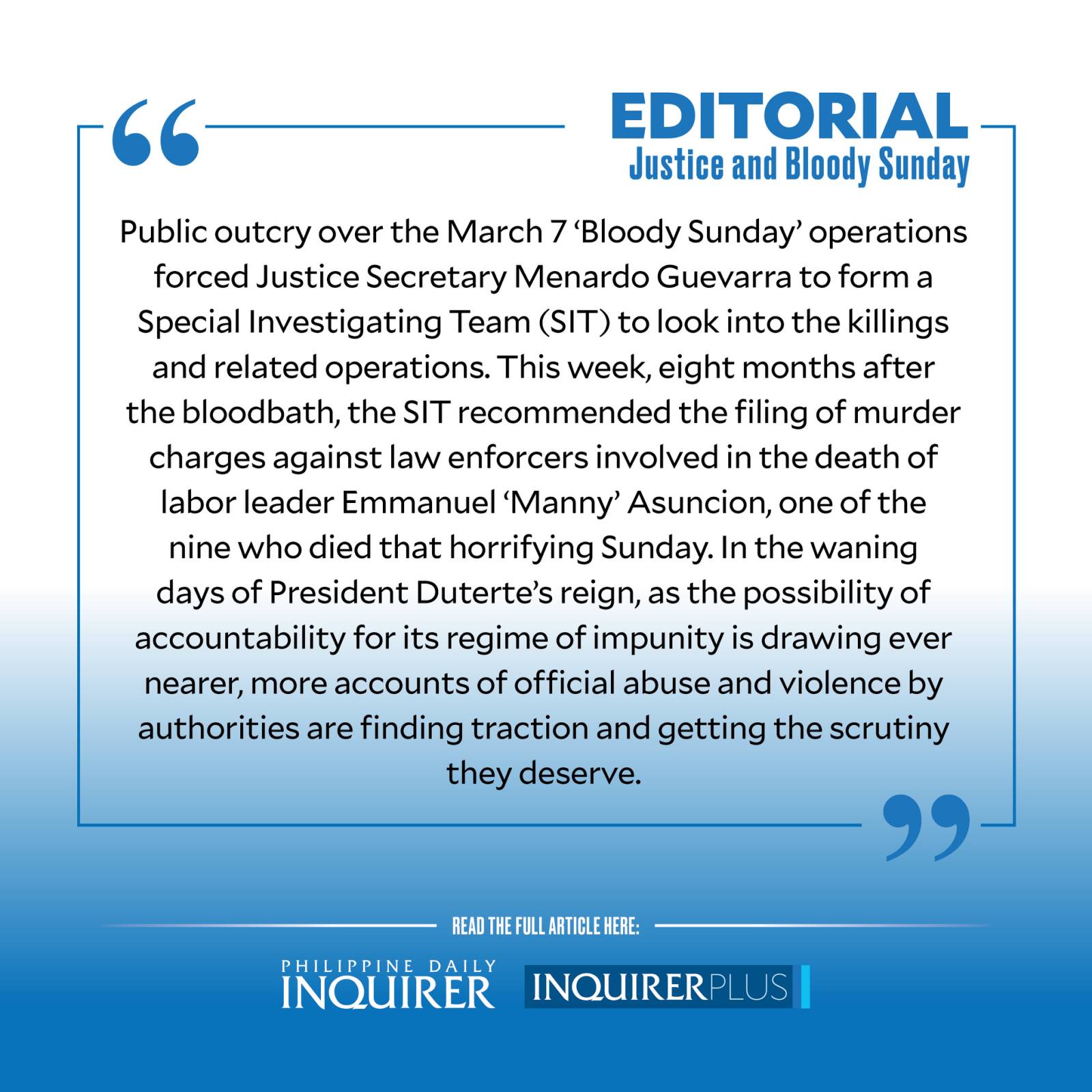Justice and Bloody Sunday
Sunday is, as decreed by no less than the Christian God, a day of rest, of leisure, of prayer and contemplation. But on March 7 this year, a Sunday, the peace of the day was broken by simultaneous police-military operations in four Southern Luzon provinces: Batangas, Cavite, Laguna, and Rizal.
What has come to be known as “Bloody Sunday” resulted in the deaths of nine activists uniformly tagged as subversive elements. Police authorities insisted that the killings were aboveboard, as the raids were carried out based on search warrants issued by courts in Metro Manila. Other courts would eventually find flaws in the contents and manner of preparation of these warrants, and quash a number of them.
Article continues after this advertisementThe nine were killed because, in a replay of a tiresome police excuse, they were said to have fought back against the enforcers.
But contrary to the common scenario following incidents of mass killings carried out against drug suspects and supposed rebels, this time a measure of official accountability was instituted. Public outcry over the March 7 massacre forced Justice Secretary Menardo Guevarra to form a Special Investigating Team (SIT) to look into the killings and related operations. This week, eight months after the bloodbath, the SIT recommended the filing of murder charges against law enforcers involved in the death of labor leader Emmanuel “Manny” Asuncion, one of the nine who died that horrifying Sunday. Guevarra said the National Bureau of Investigation is also winding up interviews of witnesses in the deaths of fisherfolk organizers Chai and Ariel Evangelista.
A total of 17 policemen will face murder complaints, most of them from the Calabarzon regional police, and one from the Calabarzon office of the Criminal Investigation and Detection Group. Hearings following an investigation have been set for next month.
Article continues after this advertisementContrary to the “nanlaban” narrative peddled by the police, noted forensic pathologist Dr. Raquel Fortun said an examination showed that the nine victims were “really shot to be killed.” All the deceased were shot in the chest. Even more damning, according to Fortun, was the finding that “the gunshot wounds, bullet holes were altered and sutured,” while the organs of some of the bodies were taken out and randomly cut.
The filing of charges by the DOJ is certainly a welcome development. But one wonders at the sudden alacrity and openness the Duterte administration is showing toward complaints from the survivor families and human rights organizations, a mere six months before its term ends.
One plausible reason is the international gaze bearing down on the Philippines’ human rights record following probes by the International Criminal Court (suspended for now) and the United Nations’ human rights bodies. Over the past years, the administration routinely dismissed and condemned international efforts to hold it to account for its behavior, but in the waning days of Mr. Duterte’s reign, as the possibility of accountability for its regime of impunity is drawing ever nearer, more accounts of official abuse and violence by authorities are finding traction and getting the scrutiny they deserve.
Perhaps it’s also significant that such responses have come during the anything-goes season of Philippine elections. Mr. Duterte is running for senator, while the ruling coalition, cobbled together from a motley selection of pro-administration parties, is finding it hard to unite behind a single, viable presidential candidate. After May 2022, the President is facing the likely specter of much-diminished wiggle room to evade official reckoning for words, actions, and directives under his administration that created the condition for years-long Bloody Sundays in the Philippines.
This is why public support for continued investigations by independent organizations, local and foreign, is still necessary and deserving of continued monitoring. Already, the sustained spotlight has resulted in a number of reforms in law-enforcement operations. Aside from ruling that police need to have at least two recording devices (including a body camera) to document their operations, the Supreme Court has also limited the power of judges in Manila and Quezon City to issue search warrants outside their jurisdiction, in response to public outrage over “warrant factories” or courts whose indiscriminate issuance of warrants had led to scores of killings of police targets.
Justice is beckoning, however belatedly, so before launching yet another “one-time, big-time” operation against hapless citizens, law enforcers will have some serious thinking to do if they don’t want the tables turned against them, and they end up as the convenient fall guys for wanton policies that violate the rule of law and their very oaths to uphold it.

















